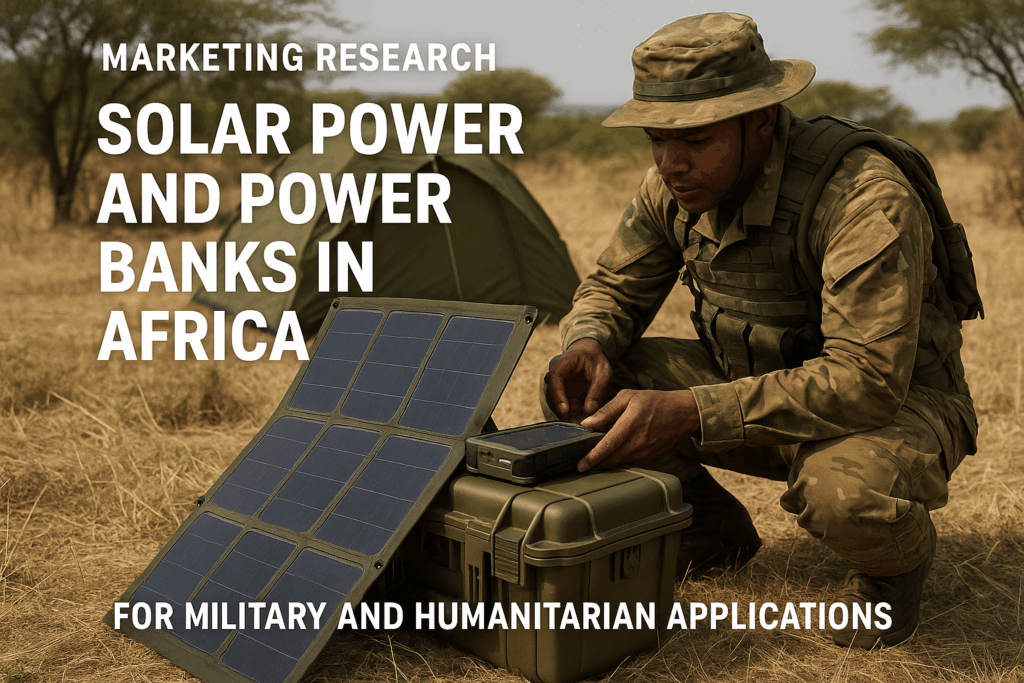AFRICA Solar Power and Power banks (Dual-Use Products)

Marketing Research: The African Market for Portable Solar Solutions and Professional Dual-Use Power Banks:
Consumers, Market Prospects,
Constraints, Mitigation Recommendations,
Overview of the Top Promising Countries
This report provides an in-depth analysis of the African off-grid energy market, with a focus on dual-use products (military and civilian applications). It includes:
- Market Potential Overview – key demand drivers, main consumers (military agencies, humanitarian organizations, UN missions), market volume and profitability forecasts.
- Regional Segmentation – priority countries and demand clusters, specifics of macro-regions (Sahel, Horn of Africa, Central, North, and Southern Africa).
- Regulatory Barriers Analysis – export controls for dual-use products, national certification standards, requirements for production localization and local content.
- Technical and Product Requirements – specifications for military and humanitarian segments, MIL-STD-810H, Sphere Energy 2024, and NATO NSN standards.
- Financial and Contract Risks – currency volatility, customer solvency, recommendations on hedging and supply chain insurance.
- Logistics and Infrastructure – key transport corridors, customs bottlenecks, and service support requirements (SLA ≤ 72 hours).
- ESG and Compliance – supply chain transparency, environmental and social responsibility, and cybersecurity standards.
- Practical Recommendations – step-by-step market entry strategy, including regulatory preparation, production localization in special economic zones, building a service network, and ESG compliance.
- Risk Map and Mitigation Measures – structured overview of political, legal, and operational risks with specific mitigation tools.
- Country-Specific Insights – comparative assessment of Nigeria, Kenya, Rwanda, Tanzania, Uganda, Egypt, and South Africa in terms of attractiveness, risks, and market potential.
The report is designed for manufacturers and suppliers of energy solutions planning to enter the African market, as well as for investors, consultants, and strategic partners.
Research Content
BRIEF
AFRICAN MARKET OVERVIEW
Regional Market Analysis and Specific Requirements
Priority Demand Clusters
Military-Operational Context
Defense Industry Regulation and Localization
Humanitarian and Expeditionary Missions
Government Defense Tenders
Technical Requirements and MIL/INGO Certification
Regulatory Barriers and Export Controls
National Standards and Certification
Product Adaptation
Regulatory Roadmap
Legal and ESG Factors
Marketing and Business Specifics
Sales Channels
Customs and Tax Environment
Lithium-Ion Battery Tax
Risk Map and Mitigation
Critical Success Factors
Procurement Channels and Tender Procedures
Consolidated Table of Requirements for Entering the African Market
Localization and Industrial Policy
Logistics and Infrastructure
Customs and Logistics Bottlenecks
Financial and Contract Risks
Financing and Payment Instruments
Table: Key Risks and Mitigation Measures
Common Mistakes of Foreign Suppliers
Key Barriers
Strategic Recommendations
Rationale for Conclusions
Strategy for Entering the African Market for Portable Dual-Use Solar Solutions
FINAL REVIEW
DETAILED BY COUNTRIES
Nigeria
Rwanda
Kenya
Tanzania
Uganda
Ethiopia
Egypt
South Africa
FOR EACH COUNTRY, THE FOLLOWING ASPECTS ARE DESCRIBED IN DETAIL:
GDP
GDP per capita
Internet penetration level
Population size
Security level
Crime rate
Licensing requirements
Specifics of starting a business for foreigners
Religion
Feedback from entrepreneurs about the country
Language of business communication
Conditions and cost of establishing a legal entity or business
State of internet infrastructure in the country
Taxation
Cost of bringing capital into the country
Availability of special economic zones or preferential conditions
Difficulties in obtaining an investor or business visa
Behavioral specifics when dealing with locals
Availability of benefits in the energy and energy-saving sector
Risk of the country’s involvement in military conflict
Which states provide military aid to the country and sell it weapons
Which foreign countries attempt to influence the political situation
Business risks for a foreign company
General conclusion on the country
If you would like to purchase the research, please contact us using the details provided in the “Get in Touch” section.

